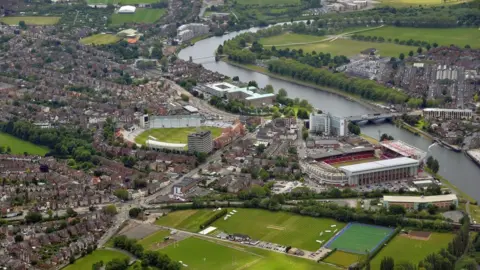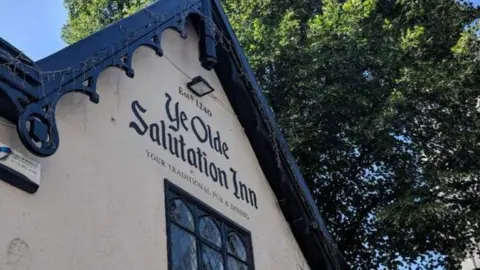Covid: Nottingham to move into tier 3
 Simon Bull
Simon BullNottingham and parts of the surrounding county will move into the top tier of Covid restrictions, it has been confirmed.
People living in the city, along with Rushcliffe, Gedling and Broxtowe, face the toughest restrictions.
The measures come into force at one minute past midnight on Thursday and will expire after 28 days.
It comes after the city consistently recorded one of the highest infection rates in the country.
About eight million people in England will be living in the tier three - "very high" alert level by the end of the week.
This means pubs that do not serve substantial meals have to close, and there are further restrictions on households mixing.

The affected parts of Nottinghamshire join Liverpool City Region, Greater Manchester, Lancashire, South Yorkshire and Warrington in the highest tier.
Details of the lockdown will be formally announced on Tuesday, but in a joint statement local councils said the measures "have been agreed to achieve a sustained reduction in infection rates" and to "protect our vulnerable residents, the NHS and social care services".
Residents and businesses who are affected will receive "a package of support similar to those secured in other parts of the country".
Though it did have the highest figures in the UK earlier this month, Nottingham's seven-day rate of infection has dropped again, according to the latest data.
The city had the 24th highest rate of infection per 100,000 people in England, at 443.7, in the week up to the 23 October, down from 677.4 the previous week.
It is still the highest in the county, but the surrounding boroughs are all seeing an increase, with Broxtowe's infection rate having risen from 310.4 to 342.9, Gedling's up from 373.2 to 418.2 and Rushcliffe rising from 359.1 to 393.5.
'Many more deaths'
David Mellen, leader of Nottingham City Council, appealed to residents to "work together" and stick to "very difficult" restrictions.
Though the seven-day infection rate for the city has dropped steadily after being the highest in the UK earlier this month, he said there were still concerns over rising rates among older age groups and hospital occupancy levels.
"We've got a growing number of people, way over 200 people, in our hospitals with Covid, and an increasing number in [intensive care units], so we are concerned about those numbers," he told BBC Radio Nottingham.
"Obviously we had many people die in Nottingham [and] Nottinghamshire earlier in the year and we don't want to add to that number with many more deaths as a result of this."
Mr Mellen also said the level of financial support from the government - which is to cover additional track and trace costs, enforcement and extra support to affected businesses - is "not enough".
He said he did not feel Nottingham had been "fully funded by the government, and we do believe that if we do a really good job on track and trace, which is absolutely necessary, it will cost us more than what is being offered".
"We tried to argue for more money, but the kind of formula that's been applied in four other [local] authority areas wasn't going to be changed for Nottingham and Nottinghamshire."
 Ye Olde Salutation Inn
Ye Olde Salutation InnNottingham South MP Lilian Greenwood criticised the government for what she said was "woeful" communication over the move into the toughest restrictions.
"It's more than a week since Boris Johnson and Matt Hancock said they were talking to [Nottinghamshire] about going into tier three, yet talks didn't even begin until Thursday and MPs weren't even briefed until Friday," she tweeted.
Jason Weston, who runs Ye Olde Salutation Inn in the centre of Nottingham, said he will not have to close because the pub serves meals, but with capacity already down to 20% of what it was in summer because of the 22:00 curfew he said it was "almost irrelevant" whether they were allowed to open or not.
"I'm very worried," he said.
"We're watching the bank balance go down week by week - it's looking very, very dark."

- SOCIAL DISTANCING: What are the rules now?
- SUPPORT BUBBLES: What are they and who can be in yours?
- FACE MASKS: When do I need to wear one?
- SCHOOLS: What will happen if children catch coronavirus?
- TESTING: What tests are available?


Follow BBC East Midlands on Facebook, Twitter, or Instagram. Send your story ideas to [email protected].
